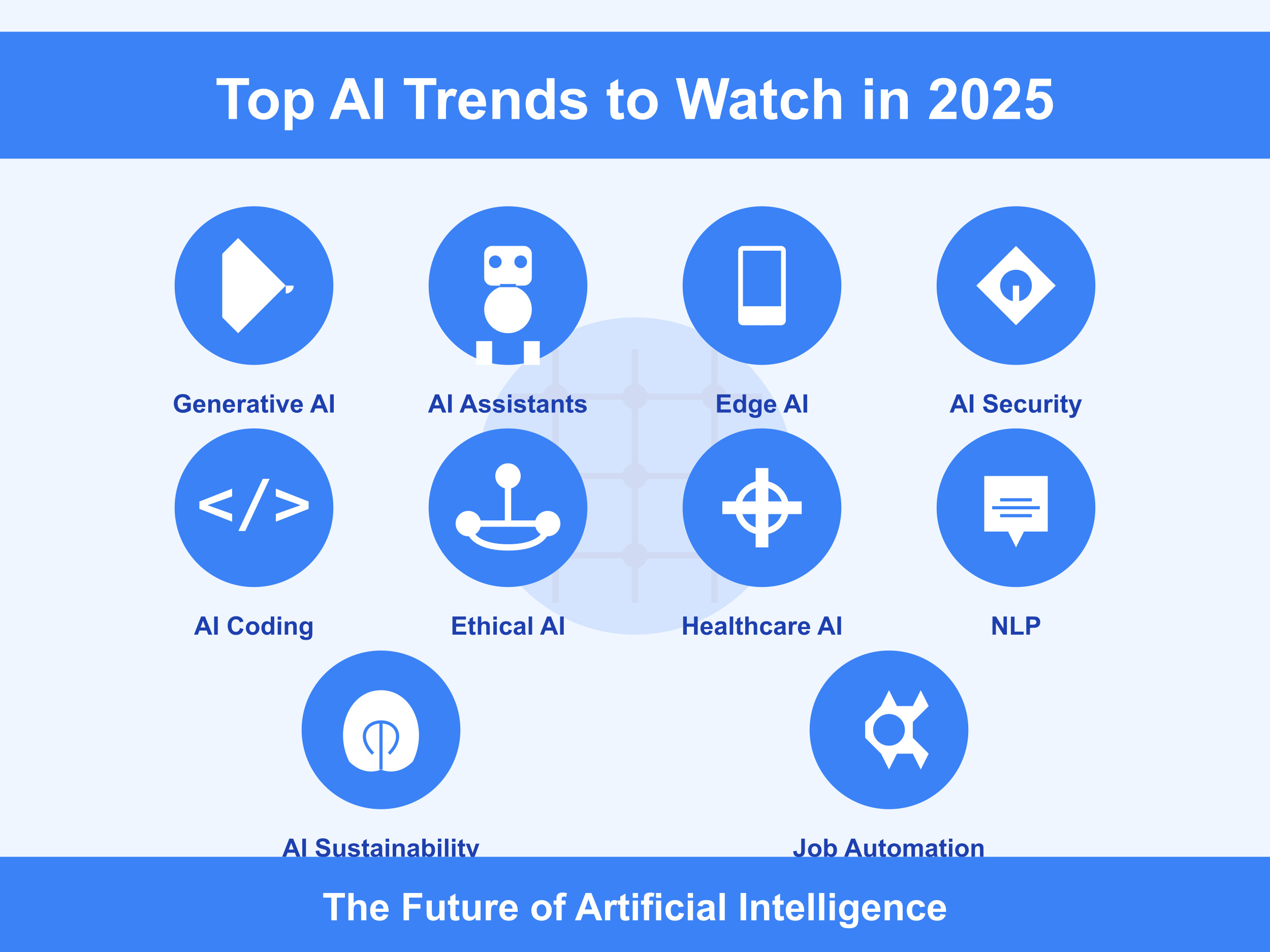Future of Artificial Intelligence in 2025: Trends, Predictions and Key Applications

Explore the future of artificial intelligence in 2025, featuring trends, predictions, and key applications that will transform our lives and businesses.

Explore the future of artificial intelligence in 2025, featuring trends, predictions, and key applications that will transform our lives and businesses.
The unstoppable advance of Artificial Intelligence (AI) has turned it into a technological benchmark for innovation and business competitiveness. AI, the engine of technological change, is already setting its sights on 2025. The future of artificial intelligence in 2025 marks a turning point in the relationship between companies, users, and society with technology, opening up a range of new trends, applications, and challenges.
The year 2024 was pivotal for AI, establishing its presence in critical sectors ranging from healthcare to services, as well as manufacturing and finance. The mass adoption of virtual assistants and business automation tools serves as a prelude to AI’s development in 2025. Moreover, the evolution of AI models and the refined efficiency of algorithms have laid the groundwork for more personalized and adaptable AI systems (source).
The future of AI is being shaped by several emerging trends. Among the most notable are:
AI in 2025 will open up a new universe of possibilities, transforming production processes and creating new employment opportunities. At the same time, society will have to adapt to new roles and rethink existing ones.
In this context, the development of artificial intelligence in 2025 promises to be a global phenomenon as more regions invest in digital infrastructure and talent. Concurrently, regulatory and ethical changes related to privacy, transparency, and the responsible use of AI are expected (source).
AI will play a transformative role across numerous sectors. In the healthcare sector, it will lead to more accurate diagnoses and tailored treatments; in education, it will drive adaptive learning; in finance, it will improve risk and fraud management; and in manufacturing, it will boost intelligent automation.
The impact of artificial intelligence in 2025 will definitively change the way we interact with our daily environment. Various studies suggest that AI is likely to bring significant transformations to our homes, transportation, entertainment, and security.
The future of AI in 2025 also presents several challenges. One of the main risks concerns data privacy and security. As AI systems become more integrated into our daily lives, the need to protect our data will become increasingly important.
On the other hand, AI offers significant development opportunities. It could become a key driver for sustainable development by helping to optimize resource use and make more efficient decisions. Additionally, AI may spur the creation of new products and services, opening up new avenues for entrepreneurship and innovation.
The future of artificial intelligence in 2025 is filled with both opportunities and challenges. AI will become even more integrated into our lives, transforming the way we work, learn, and interact with the world. However, it is crucial that society is prepared to face the challenges posed by this technological revolution. Education and social adaptation play essential roles in ensuring the responsible and ethical use of AI.
It is expected that AI will evolve towards more personalized and secure models, integrating more deeply into society and the economy. It will have a significant impact on all sectors and change the way we live and work.
Some of the main trends include the adoption of autonomous AI agents, the development of multimodal and secure models, and the hyper-personalization of products and services, among other advancements.
Key predictions include the automation of more complex tasks, the transformation of production processes, the creation of new job opportunities, as well as changes in AI regulation and ethics.
AI is expected to drive significant innovations across multiple sectors. For example, in healthcare, AI could enable more precise diagnoses and personalized treatments.
AI is expected to have a considerable impact on daily life, transforming areas from smart homes to mobility and entertainment.
The primary challenges include issues related to privacy, algorithmic biases, security, and technological dependency. In terms of opportunities, AI can lead to the development of new products and services, foster sustainable development breakthroughs, and improve quality of life through smart solutions.